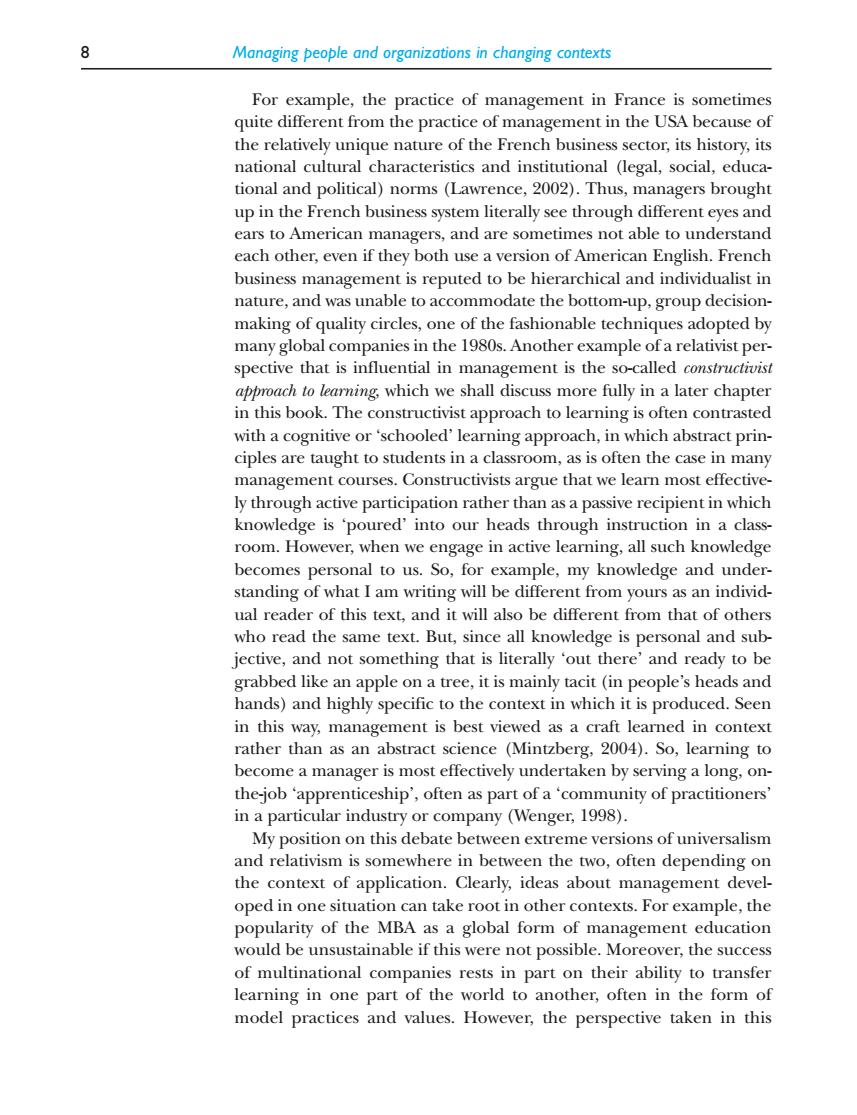正在加载图片...

Managing people and organizations in changing contexts For example,the practice of management in France is sometime quite different from the practice of management in the USA because of the relatively unique nature of the French business sector,its history,its national cultural characteristics and institutional (legal,social,educa tional and political)norms (Lawrence,2002).Thus,managers brought up in the French business system literally see through different eyes and ears to American managers,and are sometimes not able to understane each other,even if they both use a version of American English.French business management is reputed to be hierarchical and individualist in nature,and was unable to accommodate the bottom-up,group decision making of quality circles,one of the fashionable techniques adopted by many global companies in the 1980s.Another example of a relativist per spective that is influential in management is the so-called constructivis approach to learning which we shall discuss more fully in a later chapter this book.The constructivist approach to learning is often contrasted with a cognitive or'schooled'learning approach,in which abstract prin ciples are taught to students in a classroom,as is often the case in many management courses.Constructivists argue that we learn most effective ly through active participation rather than as a passive recipient in which knowledge is 'poured'into our heads through instruction in a class room.However,when we engage in active learning,all such knowledge becomes personal to us.So,for example,my knowledge and under- standing of what I am writing will be different from yours as an individ- ual reader of this text,and it will also be different from that of others who read the same text.But,since all knowledge is personal and sub jective,and not something that is literally 'out there'and ready to be grabbed like an apple on a tree,it is mainly tacit(in people's heads and hands)and highly specific to the context in which it is produced.Seen in this way,management is best viewed as a craft learned in context rather than as an abstract science (Mintzberg.2004).So.learning to become a manager is most effectively undertaken by serving a long,on- thejob'apprenticeship',often as part of a'community of practitioners in a particular industry or company (Wenger.1998). My position on this debate between extreme versions of universalism and relativism is somewhere in between the two,often depending on the context of application.Clearly,ideas about management devel- oped in one situation can take root in other contexts.For example,the popularity of the MBA as a global form of management education would be unsustainable if this were not possible.Moreover,the success of multinational companies rests in part on their ability to transfer learning in one part of the world to another,often in the form of model practices and values.However,the perspective taken in this For example, the practice of management in France is sometimes quite different from the practice of management in the USA because of the relatively unique nature of the French business sector, its history, its national cultural characteristics and institutional (legal, social, educational and political) norms (Lawrence, 2002). Thus, managers brought up in the French business system literally see through different eyes and ears to American managers, and are sometimes not able to understand each other, even if they both use a version of American English. French business management is reputed to be hierarchical and individualist in nature, and was unable to accommodate the bottom-up, group decisionmaking of quality circles, one of the fashionable techniques adopted by many global companies in the 1980s. Another example of a relativist perspective that is influential in management is the so-called constructivist approach to learning, which we shall discuss more fully in a later chapter in this book. The constructivist approach to learning is often contrasted with a cognitive or ‘schooled’ learning approach, in which abstract principles are taught to students in a classroom, as is often the case in many management courses. Constructivists argue that we learn most effectively through active participation rather than as a passive recipient in which knowledge is ‘poured’ into our heads through instruction in a classroom. However, when we engage in active learning, all such knowledge becomes personal to us. So, for example, my knowledge and understanding of what I am writing will be different from yours as an individual reader of this text, and it will also be different from that of others who read the same text. But, since all knowledge is personal and subjective, and not something that is literally ‘out there’ and ready to be grabbed like an apple on a tree, it is mainly tacit (in people’s heads and hands) and highly specific to the context in which it is produced. Seen in this way, management is best viewed as a craft learned in context rather than as an abstract science (Mintzberg, 2004). So, learning to become a manager is most effectively undertaken by serving a long, onthe-job ‘apprenticeship’, often as part of a ‘community of practitioners’ in a particular industry or company (Wenger, 1998). My position on this debate between extreme versions of universalism and relativism is somewhere in between the two, often depending on the context of application. Clearly, ideas about management developed in one situation can take root in other contexts. For example, the popularity of the MBA as a global form of management education would be unsustainable if this were not possible. Moreover, the success of multinational companies rests in part on their ability to transfer learning in one part of the world to another, often in the form of model practices and values. However, the perspective taken in this 8 Managing people and organizations in changing contexts